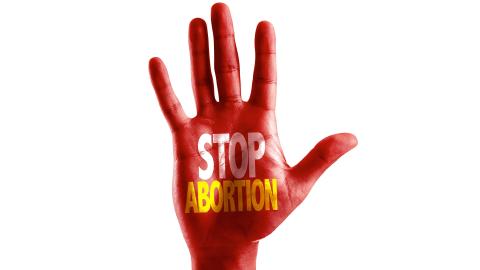
House Passes Pro-Life Pain-Capable Unborn Child Protection Act
WASHINGTON – Pro-life advocates won a victory in the U.S. House Tuesday, after Republicans advanced a bill that would ban abortions after 20 weeks of pregnancy.
The GOP-backed "Pain-Capable Unborn Child Protection Act" won by a vote of 237 to 189. While it would make it illegal to have an abortion 20 weeks after fertilization, the measure does include two key exceptions: to save the mother’s life or if the pregnancy resulted from rape or incest.
The issue sparked emotional debate from both sides of the aisle.
"I received the tough news that my son had Down syndrome. The doctors told me it would be a long road ahead," said Cathy McMorris Rodgers, who serves as the House Republican Conference Chair. "Too often, others try to define a baby's future before they are even born."
"I look at my son, Cole, and see a healthy 10-year old boy working his way through fifth grade," she continued.
New Jersey Congressman Chris Smith, a strong pro-life supporter, also offered his support for the measure.
"Even if pain wasn’t present, dismembering a child is violence against children and inhumane. But these babies actually suffer...Dr. Robert White, professor of neurosurgery at Case Western Reserve University said an unborn child at 20 weeks gestation 'is fully capable of experiencing pain…without question, [abortion] is a dreadfully painful experience…'"
Ultimately, three Democrats voted in favor of the bill, including Reps. Daniel Lipinski of Illinois, Henry Cuellar of Texas, and Collin Peterson of Minnesota. Meanwhile, Republicans Charlie Dent of Pennsylvania and Rodney Frelinghuysen of New Jersey bucked the majority of their party and opposed it.
The Pain-Capable Unborn Child Protection Act was introduced by Congressman Trent Franks, R-Ariz., in January and has since gained traction in the House of Representatives.
The measure, H.R. 36, is still a long way from becoming the law of the land. The Senate has yet to schedule a vote; however, President Trump has thrown his support behind the effort to end late-term abortions.
Ahead of the House vote, the Trump administration issued a statement endorsing the measure.
"The Administration strongly supports H.R. 36, the Pain-Capable Unborn Child Protection Act, and applauds the House of Representatives for continuing its efforts to secure critical pro-life protections."
Planned Parenthood Federation of America spoke out against the ban saying it puts women past 20 weeks at risk due to "several fetal anomalies and serious risks to the woman's health - the kind of situations where a woman and her doctor need every medical option available."
However, the bill states that pregnancies involving significant health risks to the mother are exempt from the ban.
Who does the bill protect?
H.R. 36 will prohibit the termination of an unborn baby who has reached 20 weeks of development:
"Except as provided in subparagraph (B), the abortion shall not be performed or attempted, if the probable post-fertilization age, as determined under paragraph (1), of the unborn child is 20 weeks or greater."
Science has played a significant role in this legislative initiative.
"Pain receptors (nociceptors) are present throughout the unborn child's entire body and nerves link these receptors to the brain's thalamus and subcortical plate by no later than 20 weeks after fertilization," the bills states.
In addition, the measure speaks to long-term effects caused by the pain caused during fetal development.
"Subjection to such painful stimuli is associated with long-term harmful neurodevelopmental effects, such as altered pain sensitivity and, possibly, emotional, behavioral, and learning disabilities later in life."
H.R. 36 also protects infants born after an abortion procedure fails to terminate their life:
"Any health care practitioner present at the time shall humanely exercise the same degree of professional skill, care, and diligence to preserve the life and health of the child as a reasonably diligent and conscientious health care practitioner would render to a child born alive at the same gestational age in the course of a natural birth."
Exceptions
Circumstances of rape, incest, and health of the mother are exempt from the ban.
In circumstances of rape the mother must have, within 48 hours prior to the abortion, received counseling or medical treatment for the rape.
Circumstances where the mother's life is a grave risk also create an exception:
"In reasonable medical judgment, the abortion is necessary to save the life of a pregnant woman whose life is endangered by a physical disorder, physical illness, or physical injury, including a life-endangering physical condition caused by or arising from the pregnancy itself, but not including psychological or emotional conditions."




